Related Research Articles

The Christian Reformed Church in North America is a Protestant Calvinist Christian denomination in the United States and Canada. Having roots in the Dutch Reformed Church of the Netherlands, the Christian Reformed Church was founded by Dutch immigrants in 1857 and is theologically Calvinist.
The Dutch Reformed Church was the largest Christian denomination in the Netherlands from the onset of the Protestant Reformation in the 16th century until 1930. It was the traditional denomination of the Dutch royal family and the foremost Protestant denomination until 2004, the year it helped found and merged into the Protestant Church in the Netherlands. It was the larger of the two major Reformed denominations, after the Reformed Churches in the Netherlands was founded in 1892. It spread to the United States, South Africa, Indonesia, Sri Lanka, Brazil, and various other world regions through Dutch colonization. Allegiance to the Dutch Reformed Church was a common feature among Dutch immigrant communities around the world and became a crucial part of Afrikaner nationalism in South Africa.
The Free Reformed Churches in South Africa is a federation of Protestant Christian churches. It follows Reformed Calvinist theology and has adopted the Dutch "three forms of unity" as its doctrinal standards: Canons of Dordt, Belgic Confession and the Heidelberg Catechism and subscribes to the three Ecumenical Creeds: The Apostles' Creed, The Nicene Creed and The Athanasian Creed.
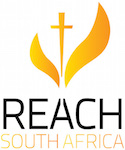
The Reformed Evangelical Anglican Church of South Africa (REACH-SA), known until 2013 as the Church of England in South Africa (CESA), is a Christian denomination in South Africa. It was constituted in 1938 as a federation of churches. It appointed its first bishop in 1955. It is an Anglican church and it relates closely to the Sydney Diocese of the Anglican Church of Australia, to which it is similar in that it sees itself as a bastion of the Reformation and particularly of reformed doctrine.
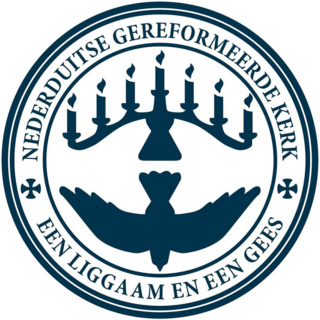
The Dutch Reformed Church is a Reformed Christian denomination in South Africa. It also has a presence in neighbouring countries, such as Namibia, Eswatini, and parts of Botswana, Zimbabwe and Zambia. In 2013 it claimed 1.1 million members and 1,602 ordained ministers in 1,158 congregations.
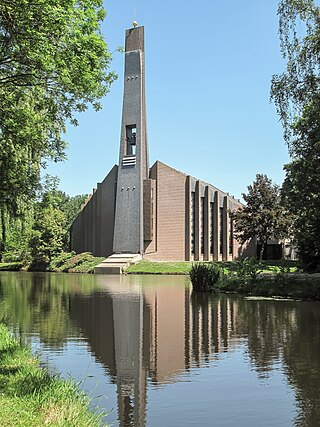
The Christian Reformed Churches in the Netherlands is a Protestant church in the Netherlands.
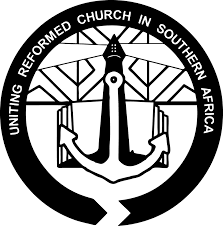
The Uniting Reformed Church in Southern Africa was formed by the union of the black and coloured Nederduits Gereformeerde Kerk mission churches.
The United Congregational Church of Southern Africa (UCCSA) is a prominent Christian denomination established in 1967, following the unification of various congregational movements within Southern Africa. Its origins can be traced back to the missionary work of the London Missionary Society in the Cape Colony in 1799. The UCCSA plays a significant role in the religious landscape of Southern Africa, with a membership of approximately 500,000. It maintains a notable presence in countries such as South Africa, Mozambique, Botswana, Zimbabwe, and Namibia. The UCCSA is recognized for its contributions to education and social justice in the region.
The Sudanese Reformed Presbyterian Churches (SRPC) are a unified body of Protestant Churches in Sudan.
The Netherlands Reformed Churches was a conservative Reformed Protestant Christian denomination in the Kingdom of the Netherlands. The denomination was formed in 1967 following a schism within the Reformed Churches in the Netherlands (Liberated).
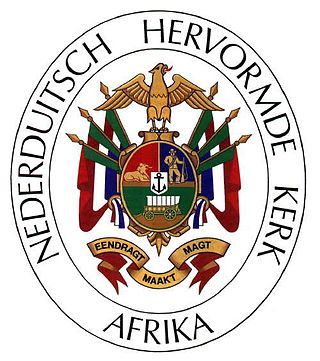
The Dutch Reformed Church in Africa is a Reformed Christian denomination based in South Africa. It also has congregations in Namibia, Botswana, Zambia and Zimbabwe. Along with the Dutch Reformed Church in South Africa (NGK) and the Reformed Churches in South Africa, the NHKA is one of the three Dutch Reformed sister churches of South Africa. The NHKA retains the old Nomenclature Nederduitsch, the word originally referring to the Dutch language. The word refers to the Low Saxon language today. The Dutch language remained the official language of the church until 1933 when the church started functioning almost exclusively in Afrikaans.
The Presbyterian Church of Nigeria is a church in Nigeria and subscribes to the Westminster Confession of Faith.

The Reformed Churches in South Africa is a Christian denomination in South Africa that was formed in 1859 in Rustenburg. Members of the church are sometimes referred to as Doppers.
The Swaziland Reformed Church was founded in 1944 and become a congregation of the Dutch Reformed Church in Africa in 1967. Later the Swaziland Missionary Board was formed to coordinate the missionary work of the Reformed Church in Swaziland. In 1989 Swaziland become a Regional Synod of the denomination. In 1991 the Swaziland Reformed Church became independent and has 20 communities within which it is working. The church was a member of the Reformed Ecumenical Council and later became a member of the World Communion of Reformed Churches.
The Reformed Church in Zambia is among the biggest Reformed churches in the country of Zambia.
The Presbyterian Church of Africa was founded in 1898 by the Reverend Phambani Jeremiah Mzimba, who broke from the Church of Scotland. He broke away because of misunderstanding between the black and white clergy. He was born in Ngqakayi, and his father was a deacon in the Presbyterian Church. Mzimba become a pastor, and was ordained in 1875. He was sent to Scotland to the anniversary of the Free Church of Scotland, but later severed its ties with the denomination. In 1898 he founded his own independent Presbyterian church. He died in 1911. The first Synod was constituted in Alice, Cape Colony. Mzimba had a dispute with the Free Church of Scotland over land and over the use of money. The Presbyterian Church of Africa is a predominantly black church. It was a small group of churches with 2 presbyteries. The church grew steadily. It is one of the oldest independent churches in Africa.

The Dutch Reformed Church in Namibia is a Christian denomination in Namibia. It is one of ten synods of the Dutch Reformed Church in South Africa (NGK), and the only one outside South Africa. It covers all of Namibia except for the Eastern Caprivi Strip.
The Reformed Church in Zimbabwe was founded by Dutch Reformed Church in South Africa missionaries on the 9th of September 1891. Andrew A. Louw begun to preach in the area near Morgenster among Shona people. The worship language of churches was Afrikaans and English. Later the denomination expanded among Nyanja people. In 1999 a new mission field was opened in Binga District, this mission field became a 'missionary' congregation in 2008 with 12 preaching posts, 12 more were added in evangelism campaigns of 2013-14, today the area has 2 congregations both with their own ministers. The young Church was administered from South Africa under the Dutch Reformed Church Cape Synod, eventually, the African Reformed Church in Rhodesia came into being, as an indigenous and independent church, under the control of church councils, four presbyteries and a synod. In 1977 it became the fully autonomous African Reformed Church. Soon after the country's independence in 1980, the name was changed to Reformed Church in Zimbabwe. Some historic church structures are still referred to as Dutch Reformed Churches and some Reformed Church members still use that name. The R.C.Z subscribes to the Heidelberg Catechism, Belgic Confession, and the Canons of Dort as its doctrinal standard. The R.C.Z is a member of the World Council of Churches, the Zimbabwe Council of Churches. In addition to its various church activities, the church has a special concern for its schools namely Henry Murray School for the deaf in Morgenster, and the Margaretha Hugo School (Copota) for the blind in Zimuto. The RCZ is also the responsible authority for a number of primary and secondary schools, a teacher-training college, Murray Theological College and the Reformed Church University (RCU) in Masvingo, as well as two hospitals and several clinics.

The Afrikaanse Protestantse Kerk, also known as AP Kerk, is a South African conservative Reformed Church federation with about 35,000 adherents. The federation consists of 103 congregations, mostly in South Africa, although the APK also includes 7 congregations in Namibia.
References
- ↑ "Gemeentes". www.nhka.org. Archived from the original on 2013-10-29.
- ↑ "Address data base of Reformed churches and institutions".
- ↑ "Dutch Reformed Church in a bitter Row". Archived from the original on 2014-04-20. Retrieved 2013-06-01.